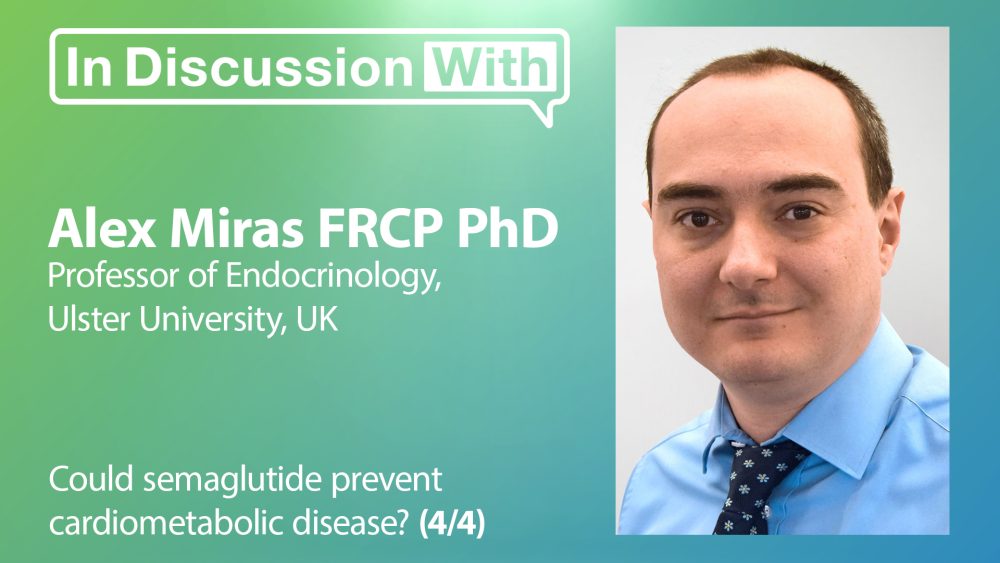Advertisment
Could semaglutide prevent cardiometabolic disease?

Professor Alex Miras, consultant endocrinologist at the University of Ulster, takes the view that obesity is a disease. He explains why this is and how the SELECT trial should determine whether semaglutide treatment might prevent future cardiometabolic disease.
“Obesity in my opinion, and in the opinion of many scientific colleagues in the field, is clearly a disease”, says Professor Miras. However, there is still controversy about this, he acknowledges. He explains the factors driving obesity as follows:
“The reason why obesity is a disease is because we know that the biological drivers that control our body weight are very, very powerful. So, what we know is that approximately 70 percent of anyone’s body weight is determined by their genetic makeup and the other 30 percent depends on other environmental factors – therefore we cannot ignore such a big number. The genetic makeup of our appetite-regulation system sits in the brain and it sits in areas that control hunger and fullness. ……In the disease of obesity, the circuits that control hunger and fullness are disrupted because of genetic mutations. As a result, this causes the symptoms of obesity and the symptoms of obesity are high hunger and low fullness. …. Lots of us that are of normal weight are just lucky, we are not smarter and we are not more educated or hard working or have more willpower than those that do not. Now I’ve talked about the biological drivers but this doesn’t mean that we should ignore the other 30 percent or so of the environmental drivers of obesity. There are many of those and the correct way of treating the disease would be to address them, for example through healthy nutrition, access to physical activity, psychological support, social support etc.”
At the same time, environmental issues need to be addressed for the prevention of obesity in order to reduce the number of people that develop the disease in years to come. “This is not just about treatment and it is not just about prevention, it is about doing both”, he adds.
One important question is whether the two-year treatment recommended in the NICE Technology Appraisal will effectively ‘retrain’ eating habits so that continuing treatment is not needed. “I get asked this question about medications a lot as to whether our appetite centres in the brain can be trained with the medication or any treatment for obesity and the answer is largely no. We know not only from our own experience but also from randomised, controlled clinical trials that when the medication is stopped the vast majority of people regain the weight that they have lost. This is because, unfortunately, the medication or even bariatric surgery does not train the appetite centres of the brain to behave in a certain way”, he says. The drugs only work while they are there, similar to the way in which anti-hypertensive treatment works. “Therefore, that means that the people who suffer with the disease of obesity need to be treated for life”, he emphasises. This may involve different medications or even other forms of treatment. Whichever route is selected the effective treatments – be they medication, nutritional, psychological, or physical activity – need to be continued long term, he explains.
SELECT trial
The next logical question is whether the use of semaglutide for obesity might prevent cardiometabolic problems in future. Professor Miras says:
“The great thing about what we have already discussed is that these medications for obesity, including semaglutide, have already been shown to reduce the number of people who develop diabetes, for example, they reduce blood pressure, cholesterol etc so their metabolic profile is very good”. The results of the SELECT trial are expected in Autumn 2023 and these should show whether semaglutide has an impact on hard clinical outcomes. SELECT is a four-year trial, involving 17,000 participants with established cardiovascular disease, who were randomised to receive semaglutide 2.4 mg or placebo. “I was privileged to be to be contributing to this trial in my unit. This trial is coming to an end as we speak and we’re really looking forward to the results because they will really change the way that we deal with obesity – and we will now have evidence not only for risk factors for cardiovascular disease but actual hard outcomes”, he says.
Disclosures:
Grants/Research Support: Fractyl, Novo Nordisk, Randox.
Other Financial or Material Support/Honoraria: Novo Nordisk, GI Dynamics, AstraZeneca, Boehringer Ingelheim, Currax Pharmaceuticals
Read and watch the full series on our website or on YouTube.





